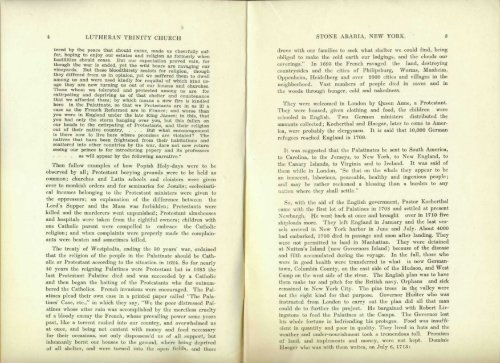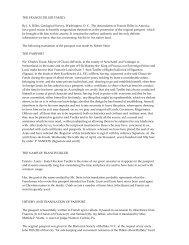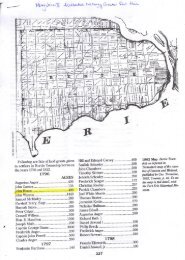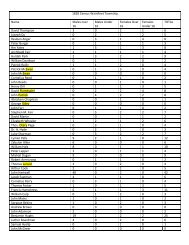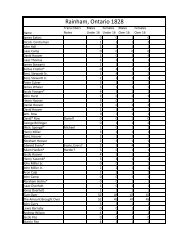Lutheran Trinity Church Stone Arabia, N. Y. - Crego-Jones Family ...
Lutheran Trinity Church Stone Arabia, N. Y. - Crego-Jones Family ...
Lutheran Trinity Church Stone Arabia, N. Y. - Crego-Jones Family ...
Create successful ePaper yourself
Turn your PDF publications into a flip-book with our unique Google optimized e-Paper software.
4 LUTHERAN TRINITY CHURCH<br />
tered by the peace that should ensue, made us cheerfully suffer,<br />
hoping to enjoy our estates and religion as formerly when<br />
hostilities should cease. But our expectation proved vain, for<br />
though the war is ended, yet the wild boars are ravaging our<br />
vineyards. But these bloodthirsty zealots for religion, though<br />
they differed from us in opinion, yet we suffered them to dwell<br />
among us and were used kindly for requital of which kind usage<br />
they are now turning us out of our houses and churches.<br />
Those whom we tolerated and protected among us are for<br />
extirpating and depriving us of that shelter and countenance<br />
that we afforded them; by which means a riew fire is kindled<br />
here in the Palatinate, so that we Protestants are in as ill a<br />
case as the French Reformed are in France; and worse than<br />
you were in England under the late King James; in this, that<br />
you had only the storm hanging over you, but this fallen on<br />
our heads to the extirpating of Protestants, and their religion<br />
out of their native country, . . . But what encouragement<br />
is there now to live here whtere promises are violated? The<br />
natives that have been frightened from their habitations and<br />
scattered into other countries by the war, dare not now return<br />
seeing our prince is for introducing popery and its professors<br />
. . . . as will appear by the following narrative."<br />
Then follow examples of how Popish Holy-days were to be<br />
observed by all; Protestant burying grounds were to be held as<br />
common; churches and Latin schools and cloisters were given<br />
over to monkish orders and for seminaries for Jesuits; eccleciastical<br />
incomes belonging to the Protestant ministers were given to<br />
the oppressors; an explanation of the difference between the<br />
Lord's Supper and the Mass was forbidden; Protestants were<br />
killed and the murderers went unpunished; Protestant almshouses<br />
and hospitals were taken from the rightful owners; children with<br />
one Catholic parent were compelled to embrace the Catholic<br />
religion; and when complaints were properly made the complainants<br />
were beaten and sometimes killed.<br />
The treaty of Westphalia, ending the 30 years' war, ordained<br />
that the religion of the people in the Palatinate should be Catholic<br />
or Protestant according to the situation in 1624. So for nearly<br />
40 years the reigning Palatines were Protestant but in 1685 the<br />
last Protestant Palatine died and was succeeded by a Catholic<br />
and then began the baiting of the Protestants who far outnumbered<br />
the Catholics. French invasions were encouraged. The Palatines<br />
plead their own case in a printed paper called "The Palatines'<br />
Case, etc.," in which they say, "We the poor distressed Palatines<br />
whose utter ruin was accomplished by the merciless cruelty<br />
of a bloody enemy the French, whose prevailing power some years<br />
past, like a torrent rushed into our country, and overwhelmed us<br />
at once, and being not content with money and food necessary<br />
for their occasions, not only dispossess'd us of all support, but<br />
inhumanly burnt our houses to the ground, where being deprived<br />
of all shelter, and were turned into the open fields, and these<br />
STONE ARABIA, NEW YORK. 5<br />
drove with our families to seek what shelter we could find, being<br />
obliged to make the cold earth our lodgings, and the clouds our<br />
coverings." In 1693 the French ravaged the land, destroying<br />
countrysides and the cities of Philipsburg, Worms, Manheim,<br />
Oppenheim, Heidelberg and over 2000 cities and villages in the<br />
neighborhood. Vast numbers of people died in caves and in<br />
the woods through hunger, cold and nakedness.<br />
They were welcomed in London by Queen Anne, a Protestant.<br />
They were housed, given clothing and food, the children were<br />
schooled in English. Two German ministers distributed the<br />
amounts collected; Kocherthal and Haegar, later to come to America,<br />
werr probably the clergymen. It is said that 10,000 German<br />
refugees reached England in 1709.<br />
It was suggested that the Palatinates be sent to South America,<br />
to Carolina, to the Jerseys, to New York, to New England, to<br />
the 'Canary Islands, to Virginia and to Ireland. It was said of<br />
them while in London, "So that on the whole they appear to be<br />
an innocent, laborious, peaceable, healthy and ingenious people;<br />
and may be rather reckoned a blessing than a burden to any<br />
nation where they shall settle."<br />
So, with the aid of the English government, Pastor Kocherthal<br />
came with the first lot of Palatines in 1708 and settled at present<br />
Newburgh. He went back at once and brought over in 1710 five<br />
shiploads more. They left England in January and the last vessels<br />
arrived in New York harbor in June and July. About 4000<br />
had embarked, 1700 died in passage and soon after landing. They<br />
were not permitted to land in Manhattan. They were detained<br />
at Nutten's Island (now Governors Island) because of the disease<br />
and filth accumulated during the voyage. In the fall, those who<br />
were in good health were transferred to what is now Germantown,<br />
Columbia County, on the east side of the Hudson, and West<br />
Camp on the west side of the river. The English plan was to have<br />
them make tar and pitch for the British navy. Orphans and sick<br />
remained in New York City. The pine trees in the valley were<br />
not the right kind for that purpose. Governor Hunter who was<br />
instructed from London to carry out the plan did all that man<br />
could do to further the project. He bargained with Robert Livingstone<br />
to feed the Palatines at the Camps. The Governor lost<br />
his whole fortune in befriending his proteges. Food was insufficient<br />
in quantity and poor in quality. They lived in huts and the<br />
weather and under-nourishment took a tremendous toll. Promises<br />
of land, and implements and money, were not kept. Dominie<br />
Haeger who was with them writes, on July 6, 1713:


